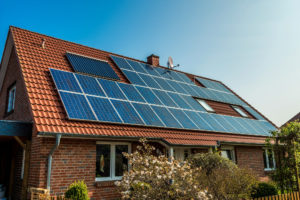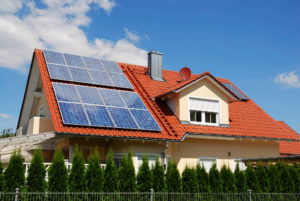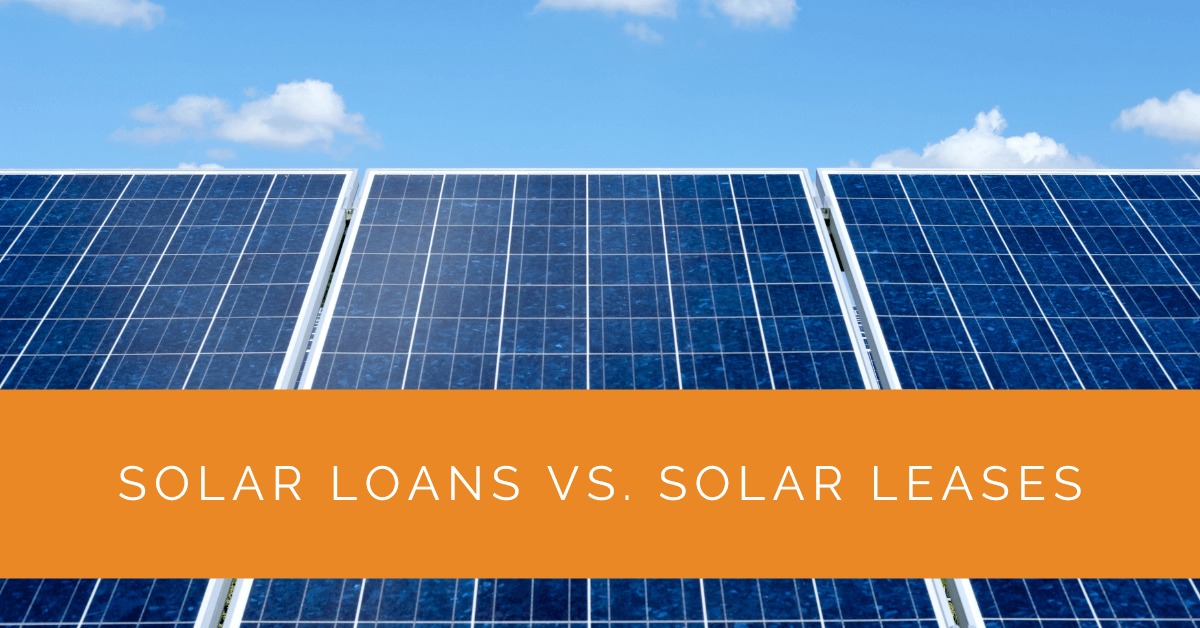The demand for solar energy continues to rise, and choosing the right financing option is crucial for homeowners considering solar panel installations. In this article, we will compare solar loans and leases, two popular methods for financing solar systems. Understanding the differences between these options will help you make an informed decision that aligns with your financial goals and energy needs.
Contents
- 1 Key Takeaways
- 2 Solar Loans: Financing Ownership
- 3 Solar Leases: Accessing Solar Power
- 4 The Difference Between Solar Loans and Solar Leases
- 5 Factors to Consider: Making the Right Choice
- 6 Leasing vs. Buying Solar Panels: Which is Right for You?
- 7 Case Study: Choosing Between Solar Loans and Solar Leases
- 8 Expert Insights From Our Solar Panel Installers About Solar Loans vs. Solar Leases
- 9 Experience Solar Excellence with Us!
- 10 Conclusion
Key Takeaways
- Solar loans allow homeowners to finance the purchase of solar panel systems, providing ownership, long-term cost savings, and eligibility for incentives.
- Solar leases offer access to solar power without upfront costs or ownership, providing immediate savings and maintenance services.
- Consider financial goals, ownership benefits, and long-term savings when deciding between solar loans and solar leases.
Solar Loans: Financing Ownership
Solar loans provide a pathway for homeowners to finance the purchase of solar panel systems while retaining ownership. Here’s a closer look at solar loans:
Benefits of Solar Loans
- Long-Term Cost Savings: With a solar loan, you can benefit from long-term savings on your energy bills. As your solar panels generate clean energy, you reduce or eliminate your reliance on grid electricity, lowering utility costs.
- Eligibility for Incentives: Owning the solar panel system makes you eligible for various incentives, including federal solar tax credits and state or local incentives. These incentives can significantly reduce your solar investment’s upfront cost and overall payback period.
- Increased Property Value: Installing a solar panel system increases your home’s value. If you decide to sell your property in the future, the solar system can be an attractive feature for potential buyers, leading to a higher resale price.
Process of Obtaining a Solar Loan
- Research Solar Installers: Research reputable solar companies and request quotes for your solar panel installation. They can provide information on financing options and connect you with trusted lending partners.
- Loan Application and Approval: Once you’ve chosen a solar installer, you must apply for a solar loan through a lending institution. The lender will evaluate factors such as creditworthiness, income, and the cost of the solar system to determine loan eligibility and terms.
- Loan Terms and Repayment: If approved, you’ll receive the loan terms, including the interest rate, loan amount, and repayment period. Solar loans typically offer flexible repayment options with fixed or variable interest rates. Make sure to review and understand the terms before accepting the loan.
Solar Leases: Accessing Solar Power
Solar leases offer an alternative option for homeowners to access solar power without the upfront costs or ownership of the solar panel system. Let’s explore solar leases in more detail:
Benefits of Solar Leases
- Low or No Initial Investment: With a solar lease, you can enjoy the benefits of solar energy without the significant upfront expense. Instead of purchasing the solar panel system, you lease it from a leasing company that owns and maintains it.
- Maintenance and Monitoring Services: Solar leases often include maintenance and monitoring services the leasing company provides. This means you don’t have to worry about system upkeep or repairs, as the leasing company takes care of these responsibilities.
- Potential Energy Savings: Solar leases allow you to save on monthly electricity bills. Utilizing the solar energy generated by the leased panels can reduce your reliance on traditional grid electricity and potentially lower your utility costs.
Process of Leasing Solar Panels
- Find a Solar Leasing Company: Research reputable local solar leasing companies. They will guide you through leasing and provide information about available lease options.
- Lease Agreement Considerations: Review the lease agreement carefully, paying attention to the lease payment structure, escalator clauses (if any), and system performance guarantees. Ensure that you understand the terms and obligations associated with the lease.
- Lease Terms and Duration: The lease terms include the lease payment amount, duration, and any applicable escalator clauses. Typically, solar leases have a duration of 15 to 20 years. It’s important to consider the length of the lease and its alignment with your long-term plans for the property.

The Difference Between Solar Loans and Solar Leases
Understanding the key differences between solar loans and leases is essential when deciding on the best financing option for your solar panel installation. Let’s examine these differences in detail:
Ownership
- Solar Loans: With a solar loan, you own the solar panel system. This means you are responsible for system maintenance, repairs, and insurance. However, it also benefits you from incentives, such as tax credits and increased property value.
- Solar Leases: The leasing company retains ownership of the solar panel system in a solar lease. They are responsible for system maintenance, repairs, and insurance. While you don’t receive the benefits of ownership, you don’t have the associated responsibilities.
Financial Considerations
- Solar Loans: When you finance your solar panels with a solar loan, you make a long-term investment. While there may be upfront costs, you have the potential for significant long-term savings on energy bills and the opportunity to recoup your investment.
- Solar Leases: Solar leases require little to no upfront costs, making them more accessible in the short term. However, lease payments replace your electricity bill savings, which means you may not experience the same financial benefits over the long term.
System Maintenance and Upkeep
- Solar Loans: With ownership comes responsibility. As the solar panel system owner, you are responsible for system maintenance, repairs, and insurance. However, you can also control the maintenance schedule and choose trusted professionals.
- Solar Leases: The leasing company is responsible for system maintenance, repairs, and insurance. They have the expertise to ensure the system operates optimally. However, you have less control over the maintenance process and rely on the leasing company to address any issues that may arise.

Factors to Consider: Making the Right Choice
To determine the best financing option for your solar panel installation, consider the following factors:
Assessing Personal Goals and Preferences
- Identify your priorities, such as long-term savings, ownership, financial flexibility, and the desire for maintenance responsibilities.
- Consider how each option aligns with your goals and preferences to make an informed decision.
Eligibility for Incentives
- Research the eligibility criteria for federal and local solar incentives, such as tax credits or rebates.
- Understand how solar loans and leases may impact your eligibility for these incentives.
Future Plans and Property Considerations
- Evaluate your plans for the property. If you intend to stay for the long term, ownership through a solar loan may provide more significant financial benefits.
- If you plan to sell the property shortly, consider the impact of solar loans and solar leases on potential buyers and the transferability of the agreement.
Leasing vs. Buying Solar Panels: Which is Right for You?
Determining whether to lease or buy solar panels depends on your unique circumstances. Consider the advantages and disadvantages of each option based on your financial goals, property plans, and preferences. Here are some factors to consider:
- Long-Term Savings: Solar loans may offer greater long-term savings potential through reduced energy bills and the opportunity to recoup your investment. However, solar leases provide immediate savings without the upfront costs.
- Ownership: Solar loans provide ownership and the associated benefits, such as increased property value and eligibility for incentives. Solar leases offer the convenience of accessing solar power without ownership responsibilities.
- Financial Flexibility: Solar loans provide more financial flexibility, as you can benefit from the system’s energy production and take advantage of incentives. Solar leases may have fixed monthly lease payments but require less upfront investment.
Case Study: Choosing Between Solar Loans and Solar Leases
Background
Solar Panels Network USA recently assisted a homeowner in evaluating their options for financing a solar panel system. The client was interested in the benefits of solar energy but was unsure whether to opt for a solar loan or a solar lease. Our goal was to provide a comprehensive analysis to help them make an informed decision that aligns with their financial goals and energy needs.
Project Overview
The project involved comparing the benefits and drawbacks of solar loans and leases, analyzing the client’s financial situation, and assessing their long-term plans for the property. Key objectives included determining the most cost-effective solution and ensuring the client fully understood the implications of each option.
Implementation
Initial Assessment We began with an in-depth consultation to understand the client’s energy needs, financial goals, and future plans for their property. This included evaluating their current electricity usage, budget for solar installation, and any potential eligibility for solar incentives.
Comparative Analysis Our team conducted a detailed comparison of solar loans and leases based on the following criteria:
- Ownership and Incentives
- Financial Considerations
- System Maintenance and Upkeep
Solar Loan Evaluation
- Ownership Benefits: We highlighted that owning the system through a solar loan allows the client to take advantage of federal solar tax credits and other local incentives, significantly reducing the upfront cost.
- Long-Term Savings: The client would benefit from reduced energy bills over time, with the potential for significant long-term savings. Additionally, the increase in property value due to the solar installation was a key consideration.
- Maintenance Responsibility: As the system owner, the client would be responsible for maintenance and repairs, but they would also have control over the maintenance schedule and service providers.
Solar Lease Evaluation
- Low Upfront Costs: We explained that a solar lease requires little to no initial investment, making it an attractive option for immediate savings.
- Maintenance and Monitoring: The leasing company would handle all maintenance and monitoring services, relieving the client of any associated responsibilities.
- Cost and Savings: While lease payments would replace a portion of the client’s electricity bill savings, the client would still benefit from lower overall energy costs without the need for a substantial upfront investment.
Results
Informed Decision
After reviewing the comparative analysis, the client decided to opt for a solar loan. The decision was influenced by the long-term financial benefits, ownership incentives, and potential increase in property value. The client valued the opportunity to maximize their investment and benefit from federal tax credits.
Successful Loan Application
We assisted the client in applying for a solar loan through a reputable lending institution. The loan application was approved, providing the client with favorable terms, including a fixed interest rate and a flexible repayment schedule.
Installation and Integration
Following loan approval, our certified installers completed the solar panel installation, ensuring all components were securely mounted and connected. The system was integrated with the client’s home energy management system for real-time monitoring and optimization.
Financial Benefits Realized
The client began to experience immediate savings on their electricity bills. The ownership of the solar system allowed them to take full advantage of the federal tax credit, further reducing the overall cost of their investment. The increase in property value was an added benefit, aligning with the client’s long-term financial goals.
Summary
This case study demonstrates the importance of evaluating personal financial goals and energy needs when choosing between solar loans and solar leases. By providing a thorough comparative analysis, Solar Panels Network USA helped the client make an informed decision that maximized their long-term financial benefits and aligned with their property plans. The successful implementation of the solar loan and the subsequent installation of the solar panel system resulted in significant energy savings and increased property value, showcasing the advantages of owning a solar system through financing.
Expert Insights From Our Solar Panel Installers About Solar Loans vs. Solar Leases
Owning your solar panel system through a solar loan allows you to benefit from incentives like federal tax credits, which can significantly reduce the overall cost.
Solar Energy Consultant
Leasing solar panels is a great option for homeowners who want immediate savings without the responsibility of maintenance and repairs.
Renewable Energy Specialist
Solar loans often offer more long-term financial benefits, while solar leases provide a low-cost entry point to renewable energy.
Senior Solar Technician
Experience Solar Excellence with Us!
Trust in Solar Panels Network USA, where our seasoned experts deliver top-quality solar solutions for homes and businesses nationwide. With a legacy of countless successful installations and a commitment to sustainable energy, we’re your reliable partner in the solar journey. Ready for a brighter, eco-friendly future? Call us now at (855) 427-0058 and harness the power of the sun!
Conclusion
Choosing between a solar loan and a solar lease requires careful consideration of your financial goals, energy needs, and preferences. Solar loans offer ownership, long-term cost savings, and eligibility for incentives but require upfront costs and maintenance responsibilities. On the other hand, solar leases provide immediate savings, maintenance services, and low upfront investment but without ownership benefits. Understanding the differences between solar loans and leases allows you to make an informed decision that aligns with your specific circumstances. Consult with solar professionals to evaluate your options and embark on your solar journey with confidence. Whether you finance your solar panel system with a loan or access solar power through a lease, deciding to go solar is a step towards a cleaner and more sustainable future.
Disclaimer: The information provided in this article is intended for general informational purposes only and does not constitute financial advice. Readers are advised to consult with a qualified financial professional before making any decisions or taking any actions based on the information provided in this article.
About the Author
Solar Panels Network USA stands at the forefront of solar energy solutions, driven by a team of seasoned solar engineers and energy consultants. With over decades of experience in delivering high-quality solar installations and maintenance, we are committed to promoting sustainable energy through customer-centric, tailored solutions. Our articles reflect this commitment, crafted collaboratively by experts to provide accurate, up-to-date insights into solar technology, ensuring our readers are well-informed and empowered in their solar energy decisions.

